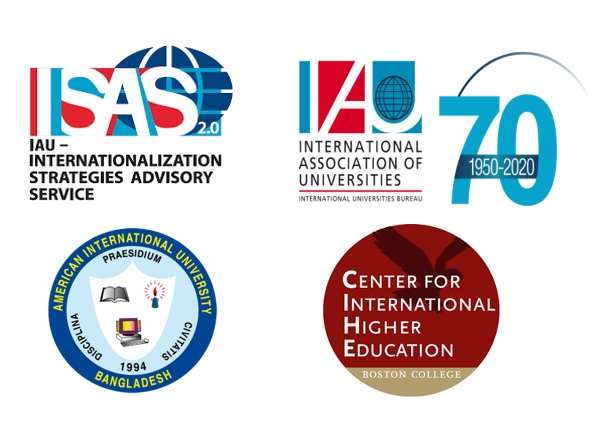The International Association of Universities (IAU) and the Center for International Higher Education (CHIE), Boston College conducted an Impact Evaluation Survey 2020 on the efficacy of the Internationalization Strategy Advisory Services (ISAS). AIUB being one of the two universities in Bangladesh to have been recipients of ISAS and one of the 18 universities throughout the world made respondent in this impact survey. As enunciated in the Mission and Vision of AIUB, this undertaking is a challenge to achieve internationalization as a centerpiece in its academic pursuit. The survey focuses on three aspects: identify the progress made vis-à-vis suggestions of ISAS; identify the reason for any gap between recommendation and implementation; and analyze and share results of development of IAU’s future advisory services. The survey was focused on the following areas:1) overall international trends 2) articulated mission/strategic plans 3) leadership, governance, structure and staff 4) financial resources for internationalization 5) internationalization of the curriculum) online and distance learning 7) human resources and staff development 8) student mobility 9) international collaboration and partnerships.
International efforts and developments have made substantial change in higher education. Universities have approached internationalization using various modalities and degree of interest. For consistency, the survey utilized and shared the same definition of internationalization to wit: the intentional process of integrating an international, intercultural or global dimension into the purpose, functions and delivery of post-secondary education, in order to enhance the quality of education and research for all students and staff, and to make a meaningful contribution to society.
Internationalization of higher education is a complex, non-linear process that must be contextualized. Funding unique regional and national considerations, a supportive framework to aid implementation, and institutional prioritization, are a few of the key variables that can either inhibit or catalyze internationalization for universities. As the key findings indicate, even in cases where internationalization efforts are well-established, working with ISAS gives universities leverage in strategically advancing those efforts. From the survey, every action completely bespoke to individual universities. The international Strategies Advisory Service process is a valuable instrument for universities desirous to develop, advance, or review their internationalization policies. Its process and recommendations have the potential to influence future institutional policy decisions.


